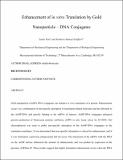Enhancement of in vitro Translation by Gold Nanoparticle – DNA Conjugates
Author(s)
Park, Sunho; Hamad-Schifferli, Kimberly
DownloadMain Article (843.3Kb)
PUBLISHER_POLICY
Publisher Policy
Article is made available in accordance with the publisher's policy and may be subject to US copyright law. Please refer to the publisher's site for terms of use.
Terms of use
Metadata
Show full item recordAbstract
Gold nanoparticle (AuNP)−DNA conjugates can enhance in vitro translation of a protein. Enhancement occurs via a combination of nonspecific adsorption of translation-related molecules and the ribosome to the AuNP−DNA and specific binding to the mRNA of interest. AuNP−DNA conjugates enhanced protein production of fluorescent proteins (mCherry, eGFP) in retic lysate mixes by 65−100%. Gel electrophoresis was used to probe nonspecific adsorption of the AuNP−DNA conjugates to the translation machinery. It was determined that nonspecific adsorption is critical for enhancement, and if it was eliminated, expression enhancement did not occur. The interaction of the mRNA with the DNA on the AuNP surface influenced the amount of enhancement and was probed by expression in the presence of RNase H. These results suggest that higher translation enhancement occurs when the DNA on the AuNP forms an incomplete duplex with the mRNA. Tuning the balance between nonspecific adsorption and specific binding of the AuNP−DNA conjugates could result in the translation enhancement of a specific gene in a mixture.
Date issued
2010-04Department
Massachusetts Institute of Technology. Department of Biological Engineering; Massachusetts Institute of Technology. Department of Mechanical EngineeringJournal
ACS Nano
Publisher
American Chemical Society
Citation
Park, Sunho, and Kimberly Hamad-Schifferli. “Enhancement of In Vitro Translation by Gold Nanoparticle−DNA Conjugates.” ACS Nano 4.5 (2010) : 2555-2560.
Version: Author's final manuscript
ISSN
1936-0851
1936-086X